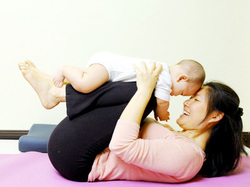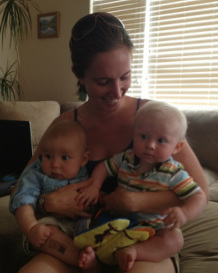 So you're about to become a mother... what kind of mother do you think you will be? Maybe it is something you have always considered: you've always cared for children, or you've idealized a mama from your past, or you are literally just hoping that you're not “that mom” on the news. Whether or not you know it, you have a mama archetype in your toolbox already. She's in there with all of her quirks and good graces. She's just waiting to hatch when your baby does. Nothing to worry about? Not so fast. Your mama archetype carries with her all sorts of good, but she comes with a shadow-side, too. It's worth peeking under the hood to see what she might look like before she arrives. How? Consult Your Mama Baggage: We all have mama baggage. Some of us have small, day-trip bags. For instance, your mama always made you take off your shoes immediately when you came in the house. She insisted that franks and weenies be served exclusively with canned corn? Do you do the same thing now? Um hum. These are quirks. They are funny, annoying, and may possibly result in tears. But they are like day-trip baggage. Some of us have larger bags, like mamas who had what may have possibly been diagnosable psychological conditions. If you can recall your mother seeming totally withdrawn, or yelling at you, your siblings, or a host of individuals only she could see, it is worth talking about this with a therapist before you become a mother yourself. Perhaps you've already processed the difficult situations you grew up with, but you have a new lens. Prepare now. Some of us have second homes. Mama baggage isn't necessarily bad things your mother did, they may be bad things that happened to her. Perhaps she passed away when you were young, or perhaps she abandoned your family. This doesn't mean you don't have any ideas about what it is like to be a mother... you may have more ideas than are physically possible in one lifetime as you assembled a mother-figure from family members, friends, and media icons. You may have set a standard for yourself that is completely unattainable. If you have the resources (like time and money), you can certainly chat with a counselor or therapist about your relationship with your mother. They might help you release the grasp on the “right” way to pack a lunch, help you anticipate any predisposition you might have for postpartum mood disorders, or support you as you build up or whittle down your idea of motherhood. If you're not sure, you can spend a little time journaling. Write down your ideas of what it means to be a mother, great mother stories, and other relevant details. Talk with your friends about their experiences becoming mothers and what surprised them. Begin to write your own story of what the motherhood journey will look like for you.
0 Comments
 Most of my prenatal clients have dreamy, lofty goals for their little ones. You can see it clearly as mama holds her belly when she walks around a tight corner, or when she instinctively responds to a kick or internal prod. When mamas drift into savasana, I can see them swim away into the daydreamy world of what their baby will be like. This is an experience of unconditional love that I get to see on a daily basis. When mamas return to Mom & Me with their babies, I get to see baby gaze back with dreamy milk-drunk eyes with a big "THANK YOU." I also hear about wobbly pelvic girdles, stretch marks, and having to pee 18 times a night. Or baby waking more than sleeping, spitting up at inopportune times, and "draining the life out of me." But that's not my focus tonight, kittens. My focus is our instinctive capacity to love this little beast, and our drive to care for it no matter what. Despite the blowout diapers, fatigue, razor sharp baby nails, and the high-pitched screams of terror we return to a state of infatuation with this little perfect nugget. My request, my plea, my wish for the world, is that we all retain that sense of love for our babies, no matter what. Regardless of the turns life takes, the surprises that baby throws our way or the divergent nature of their path from what we have planned for them, let use love them unconditionally, forever. "There are many paths up the mountain, but there is only one mountain." ~ Swami Kripalu  I'd like to think I know a thing or two about birth. I've attended dozens of births, read hundreds of birth books, and observed a number of birth classes. In fact, I wrote my undergraduate thesis on how what "we" say to pregnant women can affect their perception of the outcome of their labor. So when students ask me what kind of birth class to take, I have a few opinions on the subject. Consider the benefits of live, in-person childbirth classes: - In contrast to books and media classes, live classes are interactive which means you get your questions answered, but also those of other students. Questions you didn't even know you had! - You get to move around. Rather than just looking at pictures or video of birth positions, you can actually move and get feedback from the instructor. - Accountability to attend each class for you and possibly your partner, too. Even the best-laid plans to read books or finish seminars at an individual pace can quickly be usurped by the parts of birth preparation you think are more fun, like baby registries, showers, and assembling baby furniture. Five reasons to look beyond the hospital (for class): Sometimes hospitals offer a very inclusive and tremendous birth class, but often they are short and focus on the hospital procedure rather than the robust variety of topics and perspectives you're likely to get at an independent childbirth class. 1. You learn about birth (which is a normal thing, BTW). Literally everyone walking around out there was born, so this happens.... every day! You will learn about how your body will move through different stages of labor, learn tricks and tips to make yourself as comfortable as possible, and so will your partner. 2. You will meet other couples who you will get to know for many weeks. Most hospital-based classes are a little shorter and much larger in numbers than the other classes, which means you don't get the opportunity to connect with the other couples. This is great for partners who don't get the connection at prenatal yoga, and often don't seek out other parents-to-be. Many times these childbirth classes hold reunions a year later. If you don't yet have a village, this may be a great place to start forming yours. 3. Lending Library. Your hospital may also have a lending library, and certainly your local library has hundreds of books about birth. How will you choose? An out-of-hospital childbirth instructor often has a few go-to books that they know students appreciate and will typically lend them to their current students at no additional cost. 4. Personalization. Hospital classes typically need to cover a list of particular objectives, which may or may not be relevant to you. Independent childbirth classes are more fluid and customizable. Depending on where you live, you can find classes for high-risk mamas, first-time mamas, single mamas, mamas of multiples, lesbian mamas and more. Even if your class isn't specific for a particular group, your instructor will quickly learn about your values and help offer the information you're looking for. 5. They acknowledge that birth can happen outside of the hospital. They will not force an out-of-hospital agenda on you, but if you are the kind of person who is curious about the differences, they will share them with you. I know several mamas who planned their births in the hospital and wound up spontaneously delivering outside of the hospital because they could not transport in time. An independent childbirth class prepares you for the spectrum of birth possibilities. Questions to ask the teacher: Do you have any preference about where I choose to birth my baby? Can I ask you questions outside of class, via email or phone? Do you have a lending library that I can use? How many mamas/couples will you accept in a particular class? What is your birth-background? Where were you trained as a childbirth educator? How to tell if the teacher is one of your people: Do you welcome same-sex couples? Is there a faith background that you utilize in your teaching? Will I be uncomfortable in your classes if I do not share your faith? Will we be using art in this class? If you are in Colorado Springs and want to know about upcoming childbirth classes, subscribe to my newsletter for monthly announcements.  If you're reading this, someone has told you that prenatal yoga is a good idea. What did they tell you? Most likely they wanted you to feel relaxed, and maybe find a more restful sort of exercise than the six miles you usually run on a daily basis. Well, great! Prenatal yoga offers some time for relaxation and is indeed less vigorous than running or power yoga. But what are you actually going to get out of it? When I started teaching prenatal yoga, my answers were: mental preparation, physical strength, and a sense of community. I wasn't totally wrong! Here are what some of my prenatal clients have mentioned. Companionship: if you are the first of your group of friends to get pregnant, or if you are far away from your closest friends and family, you will enjoy getting to know women who are a few months ahead of you. Not only do you get a preview of what to expect in the next several months, you might even make friends that will support you. And then, of course, you'll end up helping the next group who are a few months behind you. Mental preparation: I know, I know, you're already mentally prepared for childbirth. Oh, you're not? Well I offer a special physical exercise that helps you prepare for what you might experience during labor. No, we don't simulate labor. And yes, some childbirth preparation classes offer the “hand in the ice bucket” or “safety pin on the ear” exercises, but you only do them once. Each time you attend a prenatal yoga class I put you in a safe yet uncomfortable place and ask you to stay there for several minutes. Each time you go through this exercise, you learn more about how YOU cope with discomfort and pain, what techniques you've learned are helpful and which are less helpful. Do you like to move when you're in pain? Be touched? Talk? Turn inwards? Come and find out. Also, for the record, this is the portion of the class that everyone notes after baby was born as the most important. Physical strength: It isn't all about relaxation, your body is training for the marathon of labor and childbirth. Rather than relaxing and “saving up” your energy, you need to move (unless your provider recommends otherwise). We use specific exercises to build strength that you will use during pushing. Keep coming to yoga until your provider tells you not to! Most women practice all the way through their pregnancy and are then much more physically ready for the work of labor. Connection: Some women instantly feel connected to their baby(ies), but most do not. Whether your pregnancy was planned or a surprise, it is important for you to spend time communicating with your baby, or opening up lines of communication. And I'm not a crazy yoga lady telling you that; your baby is affected by your hormones, your emotional response, and your stress. You don't decide when labor starts, your baby does. We spend several minutes in class opening up to this new relationship. Information: Whether you're learning where the other participants got great deals on their cribs or asking me questions about childbirth or breastfeeding, this is an unparalleled resource of information. The internet is an ocean of details and conflicting information, and sometimes it can be quite scary. I've attended many births, read most childbirth education books, met many local birth professionals, and am pursuing my certified lactation educator credential. While I don't know it all, I'm determined to help you find the answers to your questions (without scaring the bejebus out of you). Massage: This side perk is probably the reason that most women come back week after week. I'll teach you some techniques to work with a partner to relieve the discomforts of pregnancy, but I also offer a brief shoulder/neck rub during the last several minutes of class. But what are the benefits of Mom & Me Yoga?  So many mamas eagerly join me for prenatal yoga. Pregnant mamas immediately recognize the importance of self care now that they are pregnant, even if self-care was not a part of their vocabulary or their week prior to pregnancy. But once baby is born, yoga takes a back seat. And it should. I believe, and many indigenous cultures agree, that mama and baby should have some sacred alone time for the first several weeks postpartum. Now, most mamas I know don't spend six weeks alone with their babies, because it isn't practical or appealing. After six weeks, yoga can be a great addition for a number of reasons: Get OUT of the house: getting out of the house is a lot more complicated than it used to be, but that isn't a good reason to just stay home. M&M yoga gives you an appointment to shoot for where walking in several minutes (or even half an hour) late is perfectly acceptable. Everyone understands the blowout, the extra long nap, or the grand schlep to and from the car. Reality check: being home alone with an audience of a newborn (or two) can feel isolating for some mamas. Rather than consulting Dr. Google about normal behaviors for mama and baby, M&M yoga can give you a weekly view of other mamas and babies. If you're concerned about rolling over or possible postpartum depression, M&M yoga can offer a nice gauge. Breastfeeding trial run: didn't show off The Ladies in public much before baby was born? Not sure how you will feel about it? Breastfeeding is welcome during and after M&M yoga class so you can feel confident that you are in a peer group with other women who are doing the exact same thing. In fact, post-practice breastfeeding time is one of the best times of M&M yoga, especially when I bring snacks! Date with baby: if you spend all day with your baby, you probably don't schedule dates with them. And if you're away from baby for a good portion of the day, dates are a great way to connect. When you have a date with your baby, your perspective shifts from caregiver to companion. You get to play, enjoy their company, and create a very healthy dynamic in your relationship that will last your entire life. Well, and YOGA: rather than jumping straight back into vigorous exercise, M&M yoga is designed for the new mama whose body is still changing. We take special care to stretch muscles that ache from holding baby or awkward breastfeeding holds, build low body strength, and pull the tummy back to a healthy position. There's a little quiet time at the end, too! Are there benefits I'm missing? Please let me know! Sign up for my new mama newsletter for more details. Class schedule here.  If you think this post is about poop, then you're half-right. But that's not the most important half. In the last three weeks I've learned more about breastfeeding than I ever imagined possible. For instance: did you know that there is no research-based evidence that nipple creams are effective? Or that there are federal laws prohibiting the re-use of a personal breast pump? Or that a galactagogue is not an alien species? Well, now you do. So what of this is relevant to soon-to-be mamas? Well, a little bit of all of it. Here are some of my picks of relevant breastfeeding bits that you may not have known, along with some that perhaps you already knew. Breastfeeding is enjoyable: sure, some discomfort in the first two weeks is normal as you and baby figure out how to latch on and get things going. But after that, most mamas find that they enjoy the bonding experience because the act of nursing releases oxytocin, the love hormone. That's handy. Pumping, while great, doesn't offer the same neurological benefits, which is why women rarely drive off into the sunset with their pumps, nor do they pay for them to go to college. Nipple pain and engorgement are not normal: you might hear that these two painful conditions come with the territory, but that is as true as saying that lost luggage is the norm. Sure, it happens to a lot of people, but you don't need to ignore it and should seek help from a lactation consultant* if you feel either of these coming on. Usually both problems are an easy, quick fix. Success is something you get to define: so get on it! If you're interested in giving breastfeeding a try, talk to someone like me or another lactation educator. All CLE's trained by CAPPA will help you determine what success means to you and help connect you with the resources you need to meet your personal definition. No judgement. It is incredibly likely that you will provide all the milk your baby needs. A lot of companies will send you messages like "in case you don't make enough/your milk isn't good enough," but that is because they want you to buy what they are selling. Your milk is made on demand and offers the perfect balance of everything that your baby needs. Babies will start to want iron-rich foods at about six months of age, and that's when they will normally need additional food. When in doubt about supply or supplementation, always talk to an IBCLC. Don't trust everything you read on the internet (including this). Why? Because you may drop everything to run out and buy cabbage leaves when all you need is a cold compress. There are lots of old wives tales about breastfeeding, and some of them are accurate, some are harmless, and some are incredibly dangerous. I like La Leche League International for easy to read and access information. Be wary of the resources you use, and consider their motivations. Are they trying to sell you a product? And does that product involve you breastfeeding more or less? Exclusively breastfed babies' $#it doesn't stink. This was the most mindblowing of everything I learned. If you need proof, this is a great time to explore chat rooms and facebook groups. Babies who drink only human milk make poop that smells a little like buttermilk and is easy to wash out of cloth diapers and clothing. Now that's a party trick I can get behind! *in an upcoming blog post I'll explain all of the different professionals who specialize in breastfeeding so you know the lingo. I always recommend an Internationally Board Certified Lactation Consultant (IBCLC).  Borrowed from http://runningahospital.blogspot.com Every time I do anything even remotely ingenious, dorky, or with the aid of a list, my father says, "Genes work!" When I was younger, I was embarrassed by this, thinking that the comment was heavy on the "dorky" and light on the "ingenious" because my father shares my penchant for self-deprication. But as I've grown up a bit more, I realize that he's saying this as a compliment. He's proud of his achievement. Biologically, scientifically speaking, we are a legitimate species if we can produce reproductively viable offspring. In plain-speak: we all want to be grandparents. I think this goes beyond weekends at grammy's, cookies and fishing. In fact, I think it goes far beyond biology. While my father takes pride in passing along my genetic code, including my Lithuanian green eyes and my exceptionally long monkey toes, I believe that the true source of his pride lies in the things he taught me both explicitly (the genius of list-making and preparedness) and accidentally (geek-speak). Although he always threatens to write a memoir, my father isn't a big writer. He's a story teller. As am I (and I'm equally terrified to write anything actually significant). Perhaps what scares me most about possibly becoming a parent, is the fact that I'll be sharing not only what I hope to share with my children (my world-class packing skills), but what I might inadvertently share (my irrational fears of news media, basketball, cats, and the body scan at the airport). I believe that children pick and choose the best parts of their parents and other adults and emulate what they can. I also know that some darkness transfer is unavoidable. But I believe it is our duty to our species and our planet to leave things better than we found them. To weed through the muck and hand over a slightly better version of ourselves to the next generation. Prepare to be an AWESOME Grandma/pa: 1. Identify the habits that you are least interested in sharing with your offspring. Perhaps there is some disordered eating behavior in your past or a love of slot machines. Consider getting professional help managing these issues, rather than hoping you will hide them from your children. Remember when your parents tried to hide things from you? Exactly. It doesn't work. 2. Get rid of the things you don't want your children to find. Perhaps there are some juicy love letters that you'd rather not share with your 13 year old. Get a safety deposit box or off site storage unit now. 3. Tidy your relationships with your partner, parents, siblings, and neighbors. Unless you want your toddler to call the crotchety neighbor "Mr. S#its," as you have, clean it up now. 4. Cultivate your quirks. Aside from their teen years, when they are most likely to harbor intergalactic parasites, your child has the potential to love even the weirdest things you do and consider them normal. Do you remember going to junior high and realizing that no one else had parents who wrote the date on everything coming into the house? Do you remember how normal your parents' behavior seemed to you? 5. Open yourself up to new ideas and foster a willingness to let your children change you. As a family, you'll get to create new norms and values.  My best friend gave birth to her son ten years ago, my flower girls are graduating from high school, and people I used to babysit for have children who can speak in full sentences. And yet every time I see each of these babes I think to myself: 1. Who are you and what have you done with the two year old I loved and 2. I am now that old lady I used to hate who would say "my, how you've grown!" There are days when I can't believe I'm not five years old. We all know that babies grow too quickly. People tell pregnant women this very thing every day, "treasure every moment," or, "hold on to this sweet age as long as you can," or, "I enjoy nude parasailing in Niagra Falls, and you should try it, too." Ok, maybe they don't say the sailing bit, but it makes just about as much sense. You can't possibly hold onto every moment that goes by, because if you did you wouldn't have time to watch it (or you would be making a video of you watching a video). It is the slimy paradox of easy camera access these days. Have you traveled to any of the local wonders in your town and experienced the tourists taking in the beauty of the Garden of the Gods or Malibu Beach or the Biggest Gumball in Texas? Have you noticed that each one is hiding behind a small, squarish box made of metal and glass, squinting one eye? This may be how your child remembers you, if you're not careful. Now, I'm not saying you shouldn't take pictures of your children. You should. You should take lots of pictures, videos, sound recordings, and you most certainly will want to encase parts of them (the children) in cement or dough (briefly) to preserve just how tiny that little hand or foot was. But you should also write stories, do interpretive dances (together), have private moments and just be. Because the beauty of a photo is that it remains the same forever. It can be touched up to hide those unsightly wild hairs or colorized and digitally remastered to appear old timey or even more fabulous. But it can never get any sweeter, the way true memories do. Unless you're steadfastly attached to grudges about all of your exes, you probably think better of them today than you did the day you broke up, right? The same may be true of your favorite memories. Just as yoga exists between the asana, the beauty of life exists between the photographs. Photography suggestions: Hire a pro. I know that there are dozens of apps for taking and forging images out there, but nothing compares to the quality that a professional can get. That's why they are professionals. They will make sure you look natural and fabulous, and you'll be glad you did. Spend at least as much time on each side of the lens. Even Hitchcock made an appearance in each of his films, and so should you. Otherwise when baby looks back 50 years later they will wonder what you looked like and why you were so intent on harassing them in every moment of their lives. Back them up. Print them, email them, store them on hard drives. You decide your privacy factor, but make sure that whatever you're doing doesn't live exclusively in your iDevice or at one place or another. One of the best games for a rainy day? Look at old photographs (this requires old photographs). Share the LOVE. However you choose to do this is up to you. Perhaps private albums on Picasa or Facebook, or publicly as the face of your product. This helps those of us who live far away avoid the "Oh my GOSH have you GROWN UP!" comments that every child fears. Give them the power. In the hands of a child, anything is possible. Once they can manage the complexity of iPhotography, hand them the brick and let them shoot. See the world through their eyes. You might be surprised by what you see!  Me, with two great conversationalists. Me, with two great conversationalists. The most common complaint I hear about being a new mama? Abject boredom once the circus leaves town. Don't mistake me, most mamas breathe a sigh of relief once family, in-laws and outlaws ride off into the sunset, but a few days later magazines, Facebook, and daytime TV start to lose their charm. Some mamas immediately join playgroups or mama and me yoga. But even these outings, as arduous as they can be the first couple of times, don't fill 24 hours. Suggestions for Things to Occupy Your Mind Stitcher. Video may have killed the radio star, but bad writing and political commercials killed the TV star. I love listening to podcasts, but know that it can be tricky for new mamas to download new episodes or spend time synchronizing devices. Stitcher is an application for mobile devices that works like Pandora radio. You download the free app and then have access to streaming podcasts. My favorites include This American Life, Fresh Air, Freakonomics, La Tavola Marche, and The Boob Group. Handheld readers. The beauty of a Kindle in particular is that you can read a library of books with one hand, without turning on a bright light (some phones also work, but the lighting isn't quite as fancy). It is backlit and lightweight, and easy to manage while breastfeeding. Our local library lends ebooks which you can obtain without even leaving home. Bored in the middle of the night? Download something new. Research. If you have the internet, the world is your oyster (but beware the undertow). Look for positive things, like vacations you'd like to take, graduate programs you might pursue, or how to win big at blackjack. Avoid the rabbit hole of medical websites. Do not research All the Things that Could Go Wrong, because there are plenty of panicky messages on message boards with truly insane recommendations for home remedies. Plan a mythical trip to Sweden, or learn what it takes to get a visa into Bhutan, but don't google "small red rash on baby's booty." Also, if I may recommend avoiding games. Sure, they make the time go by, but at the end of the day you will have nothing to chat about with your partner or the other mamas at yoga. Learn a thing or two and make yourself an excellent conversationalist because you may end up talking to yourself at times, and don't you want to be interested in what you have to say?  Let me be clear: this post will not address paternity woes, suggestions for "keeping things fresh," or sutras of any kind. This post is an introduction to life once baby arrives and your current household transforms from a twofer into a threefer. Think back to the time that you and your partner began to co-habitate. It probably started off all nachos and dance parties and then evolved slowly into dish disputes, towel arguments, and misplaced mail warfare. Then (as you are now expecting a baby) something probably took a turn for the better again. You devised some sort of system, whether it involves pre-printed lists on the fridge or not. Knowing that Thursday night is poker night for your partner, you take the opportunity to paint your toenails in your dainties and rock out to Stevie Nicks. And every other Saturday you hike into the wilderness together to talk about the Big Dreams you have for the future and other relevant relational business. Three kinds of time: mine, yours and ours. With the impending growth of your family unit, you will begin to experience the same sorts of growing pains as you figure out your time alone, partner's time alone, the two of you together, you and the baby together, and your partner and the baby together. You've just doubled the flavors of time that are essential to a balanced and healthy home, and you have few positive examples of how this works successfully. In fact, most sit-coms and romantic comedies are based on the principle that when three people try to be in a relationship together it is both epically hilarious and desperately tragic all at once. Tips for Doubling Your Fun Define your six flavors of time. Before baby arrives, decide what time you need that is sacred, what time your partner needs, and what time your relationship needs in order for it to thrive. What are the activities that you do that fill in these three flavors? Write them down in a list so that you may refer to it after baby arrives (color coding is optional). Recall your weak spots. Remember what you used to (or still) fight over? These may be the areas that crop up again. If they are simple, make a concerted effort to meet your partner half way by emptying the garbage occasionally or not returning empty packaging to the refrigerator. If the issues are more complex, like say sex or money, this might be an excellent time to enlist the help of a good financial planner or therapist. Dream BIG. Start brainstorming the things you've always wanted to do with your child, both as a couple and individually. These are great lists to make, too. Once baby arrives you can start to try on or craft new traditions. Give baby time to grow into. There is a magical seventh flavor that won't develop for awhile, but it is important to parent as though it already exists: baby's time alone. It is critical for the emotional health of your family that your baby learn to spend time alone. Now, I'm not recommending that your infant be left unattended, but I am suggesting that baby learn to entertain her as she grows without the constant feedback of an adult. This is where your child will explore and develop her personality. If you know how important your alone time is to you, you'll respect the necessary alone time of your child as well. And that's the recipe for a successful threesome. |
About meI'm one of those people who loves making your life easier (and I believe in you). I am an experienced registered prenatal yoga teacher and a lactation educator. Want more? My monthly newsletter might be for you.
Archives
April 2014
Categories
All
|
 RSS Feed
RSS Feed
